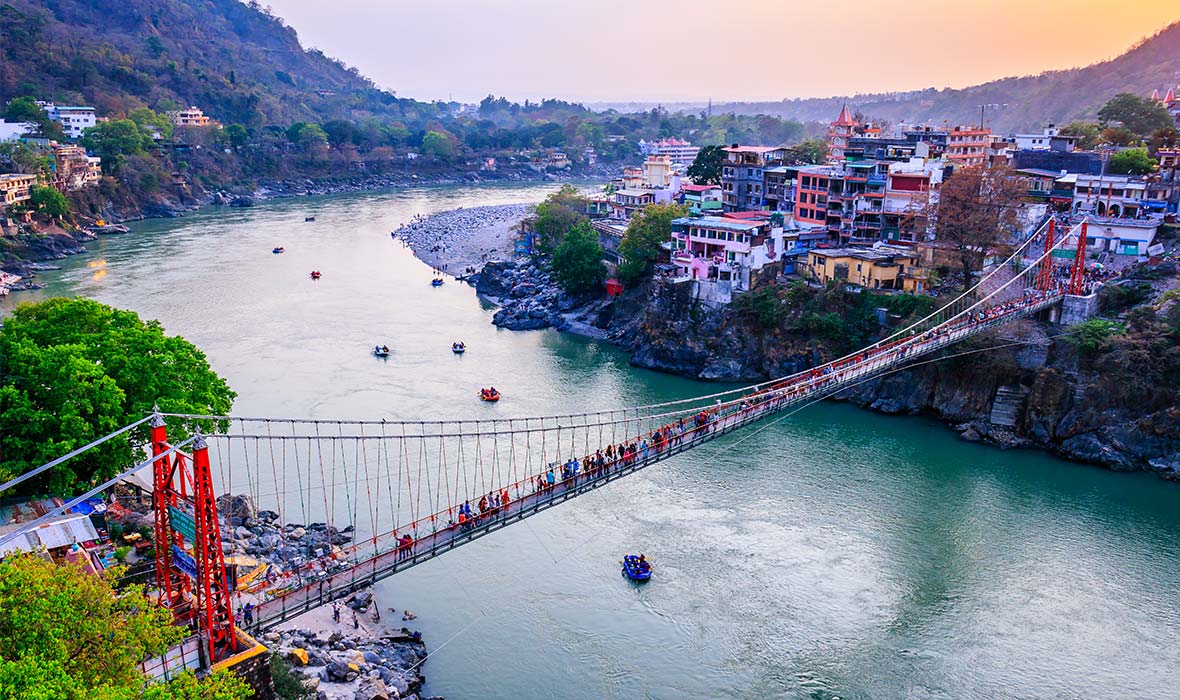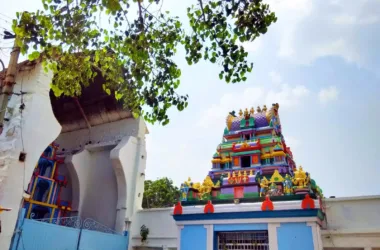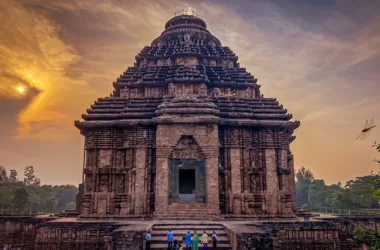Escape to Rishikesh: Nestled in the foothills of the Himalayas, Rishikesh is a serene town that exudes a spiritual vibe. The town has become an increasingly popular destination in recent years, particularly for those seeking to immerse themselves in yoga and meditation practices. My journey to Rishikesh was one that I will cherish for a long time to come.
Escape to Rishikesh
Day 1: Arrival in Rishikesh
I arrived in Rishikesh after a long and tiring journey. The town’s tranquility and calmness immediately washed over me as soon as I stepped out of the airport. I was greeted by the sounds of the River Ganges, which flowed peacefully alongside the town. I checked into my hotel and spent some time getting acquainted with the surroundings.
Later in the evening, I decided to take a stroll by the river, which was a popular spot for tourists and locals alike. The cool breeze and the sound of the flowing water provided a perfect backdrop to the beautiful sunset that was unfolding before my eyes. I could already tell that my time in Rishikesh was going to be special.
Day 2: Exploring the Town
I woke up early the next day to start exploring the town. Rishikesh is known for its ancient temples and ashrams, and I was eager to learn more about them. I started by visiting the Trimbakeshwar Temple, one of the most famous temples in the town. The temple’s architecture was simply breathtaking, with intricate carvings and designs adorning its walls. I spent some time exploring the temple’s various sections, which included a shrine dedicated to Lord Shiva.
Next, I visited the Parmarth Niketan Ashram, which is one of the most popular ashrams in Rishikesh. The ashram is located on the banks of the Ganges, and its peaceful surroundings provided a perfect environment for yoga and meditation practices. I took part in a yoga session at the ashram, which was led by a knowledgeable and experienced instructor. The session left me feeling energized and rejuvenated.
In the afternoon, I visited the Beatles Ashram, which was made famous by the band’s visit to the ashram in the 1960s. The ashram is now abandoned, but its walls are covered with colorful graffiti and murals, making it a popular spot for tourists to take photos.
Day 3: Adventure Sports
Rishikesh is known for its adventure sports, and I was excited to try some of them out. I started the day by taking a white water rafting trip down the Ganges. The rapids were exhilarating, and the views of the surrounding mountains were simply breathtaking. The experience left me feeling alive and invigorated.
In the afternoon, I decided to try my hand at bungee jumping. I was nervous at first, but the experienced staff at the bungee jumping facility put me at ease. The jump itself was over in a matter of seconds, but the rush of adrenaline was something that I will never forget.
Day 4: Meditation and Reflection
After two days of exploring and adventure sports, I decided to take a break and spend a day in quiet reflection. I visited the Swarg Ashram, which is known for its peaceful surroundings and meditation sessions. I spent the day in silent meditation, surrounded by the sounds of the river and the chirping of birds. It was a much-needed break from the hustle and bustle of daily life.
Day 5: Last Day in Rishikesh
On my last day in Rishikesh, I decided to take a walk to the Neer Garh Waterfall. The walk to the waterfall was a bit more strenuous than I expected, but the view was worth it. The waterfall cascaded down the mountainside, creating a pool of crystal-clear water at the bottom. I took a refreshing dip in the pool and spent some time relaxing on the rocks nearby, taking in the stunning scenery.
In the afternoon, I visited the Lakshman Jhula, a suspension bridge that spans the River Ganges. The bridge is an important landmark in Rishikesh and is believed to have been built by Lord Rama’s brother, Lakshmana. I walked across the bridge and explored the markets on the other side, which were filled with souvenirs, clothing, and jewelry.
As the sun began to set, I made my way back to my hotel, feeling grateful for the incredible experiences I had during my time in Rishikesh. I knew that the town had left a lasting impression on me, and I vowed to return one day.
Conclusion:
Escape to Rishikesh: It is a place that has something to offer everyone, from adventure sports enthusiasts to those seeking spiritual enlightenment. The town’s serene surroundings, ancient temples, and ashrams, and its proximity to the mountains make it a must-visit destination in India.
As a travel writer, I highly recommend Rishikesh to anyone looking for a unique and meaningful travel experience. The town’s charm and beauty are truly unmatched, and I can guarantee that a trip to Rishikesh will leave a lasting impression on anyone who visits.
Similar Articles
- Places To Visit in Rishikesh
- Haridwar & Rishikesh – A Spiritual Journey
- Rishikesh Travel Guide: The Birthplace of Yoga
Frequently Asked Questions About Rishikesh
Q: What is Rishikesh known for?
A: Rishikesh is known for its spiritual significance, ancient temples, yoga and meditation practices, adventure sports, and its location on the banks of the River Ganges.
Q: What are some popular adventure sports in Rishikesh?
A: Rishikesh is known for whitewater rafting, bungee jumping, zip-lining, and rock climbing.
Q: What is the best time to visit Rishikesh?
A: The best time to visit Rishikesh is from September to November and from February to May. The weather is pleasant during these months, and the town is not too crowded with tourists.
Q: What are some famous temples in Rishikesh?
A: Some famous temples in Rishikesh include the Trimbakeshwar Temple, Neelkanth Mahadev Temple, and the Bharat Mandir.
Q: Is Rishikesh safe for tourists?
A: Yes, Rishikesh is generally safe for tourists. However, like any other place, it is important to take basic precautions and be aware of your surroundings.
Q: What is the nearest airport to Rishikesh?
A: The nearest airport to Rishikesh is the Jolly Grant Airport in Dehradun, which is located about 35 kilometers away from the town.
Q: What is the significance of the River Ganges in Rishikesh?
A: The River Ganges is considered to be a sacred river in Hinduism and is believed to have purifying powers. Many people come to Rishikesh to take a dip in the river and cleanse themselves spiritually. Escape to Rishikesh









